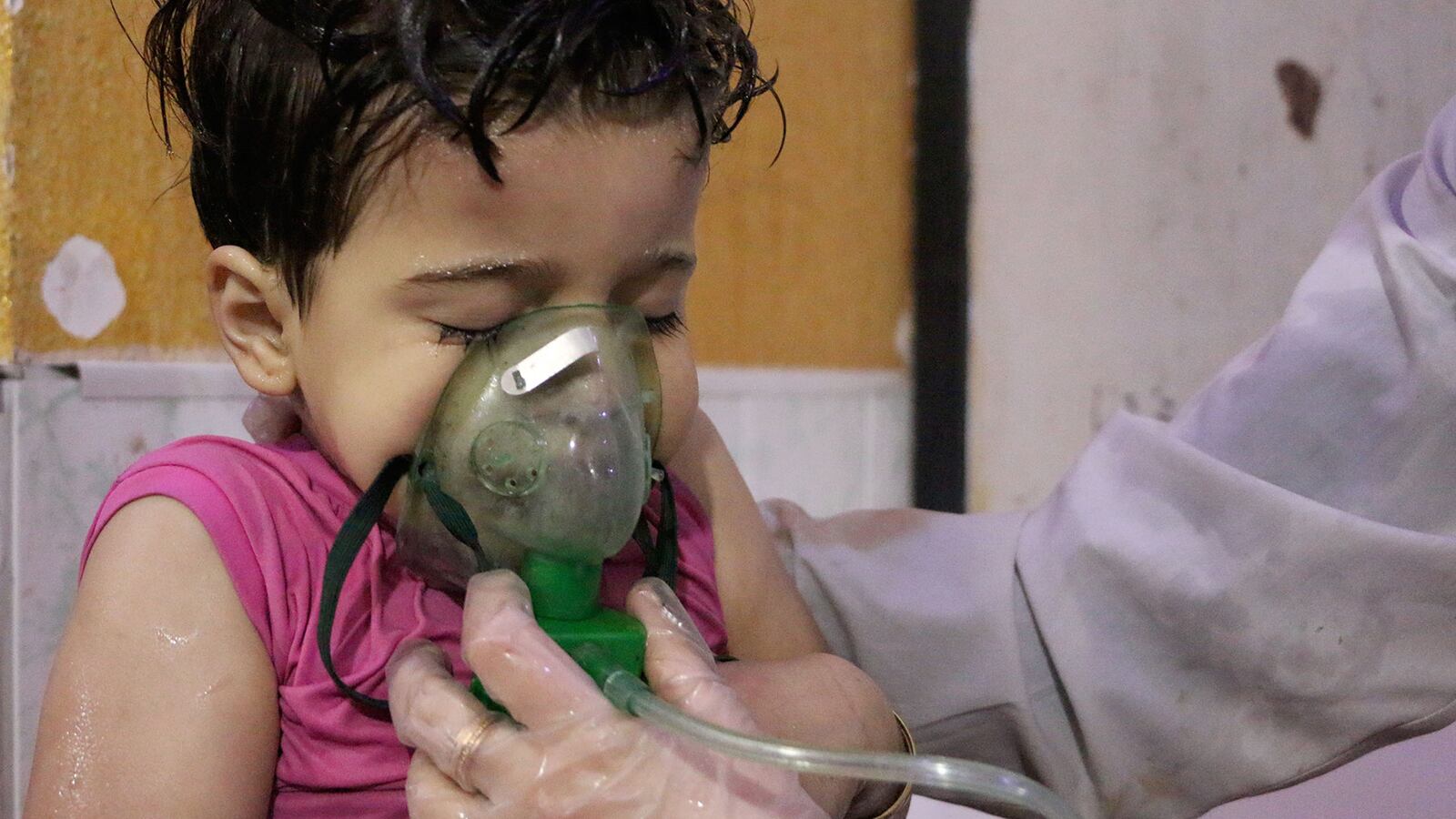President Trump is threatening a “big price to pay” over a suspected chemical weapons attack by the Assad regime which killed dozens of civilians in the opposition-held Damascus suburb of Douma this weekend.
With Trump now pledging “major decisions” on Syria in the next 24-48 hours, many brace for the possibility of a strike against Assad’s military similar to the cruise missile attack the U.S. launched against Shayrat Air Base in April 2017 after it was used to drop nerve-agent munitions on the town of Khan Sheikhoun.
But the chemical attack in Douma, if confirmed, would be far from the only suspected case of Syria’s military poisoning civilians since the April 2017 attack on Khan Sheikhoun—or even in the suburbs of Damascus, where this weekend’s attack took place.
First responders, rebel groups, and non-governmental medical organizations have accused the Syrian government of using chlorine gas against civilian in a series of attack over the past year, many of them in the same area hit on Saturday.
The strike on Shayrat Air Base led to a brief decline in allegations of chemical-weapon attacks by the Assad regime before an uptick in reports in the summer, starting in July around East Ghouta and Ain Tarma—rebel-held enclaves northeast of the capital.
Those attacks, according to the open-source investigative news outlet Bellingcat, saw a shift in the weapons used to deliver chlorine gas from primarily air-dropped cylinders towards greater use of improvised rocket munitions to pummel targets.
In November, the non-governmental Syrian American Medical Society (SAMS) issued a statement indicating it had treated dozens of civilians in East Ghouta for exposure to both chlorine and phosphorus compounds following an artillery strike. But officials could not determine the exact chemical substance patients had been exposed to as a siege of the area deprived the group of equipment necessary to “effectively diagnose and respond accordingly.”
Throughout January and into early February 2018 residents in rebel-held areas and first responders from Syrian Civil Defense reported at least three allegations of chlorine use in the Douma neighborhood on January 13, January 22, and February 1.
Following the latter January incident, then-Secretary of State Rex Tillerson blasted Russia: “There is simply no denying that Russia, by shielding its Syrian ally, has breached its commitments” to prevent Assad from using chemical weapons,” he said.
Separately, residents in Saraqeb, Idlib reported exposure to chlorine from munitions dropped by a military helicopter on February 4, according to SAMS and testimonies of witnesses published by Bellingcat and recorded by human-rights group Syrians for Truth and Justice (STJ). A video from Syrian Civil Defense and photos from STJ of the affected area show burst yellow cylinders similar to those documented in previous alleged chlorine attacks.
French Foreign Minister Jean-Yves Le Drian announced that "all indications show us today that the Syrian regime is using chlorine gas at the moment" following the February 4 incident and UN Ambassador Nikki Haley claimed that Syria had used chlorine gas “multiple times in recent weeks” and that there was “obvious evidence from dozens of victims. ”
Reports of chlorine use outside Damascus also picked up again following the February 18 announcement of a Syrian military operation nicknamed “Operation Damascus Steel,” intended to reclaim the rebel pockets northeast of the capital.
Starting in late February and into early March, first responders and medical personnel claimed chlorine attacks in a host of areas outside Damascus, including in al-Shayfouniya, East Ghouta on February 25; in Hamoryah on March 5; and and in East Ghouta again on March 7. Reuters subsequently reported that the OPCW had launched an investigation into the February 25 attack.
The repeated claims of chlorine use in early March prompted the Trump administration to begin exploring options for retaliatory strikes against the Assad regime, according to reporting from the Washington Post. Defense Secretary James Mattis warned that “It would be very unwise for [the Syrian military] to use weaponized gas,” and added that “There’s an awful lot of reports about chlorine gas use or about symptoms that could be resulting from chlorine gas.”
While possession of chlorine—which can be used as a legitimate industrial chemical or a choking agent in war—is not banned by Chemical Weapons Convention, the treaty states that “Any chemical used for warfare is considered a chemical weapon by the Convention.”
The Syrian government has denied using chlorine and other chemical weapons against civilians and agreed to dismantle its chemical weapons program in a 2013 agreement with the Obama administration following a nerve agent attack in East Ghouta but Western intelligence services believe the Syrian military did not dismantle all of its chemical weapons stockpiles. The Joint Investigative Mechanism (JIM) established by the U.N. and the Organization for the Prohibition of Chemical Weapons has concluded that the Assad regime used chlorine gas in attacks against opposition areas and carried to the the April 2017 sarin attack on Khan Sheikhoun.
In October, Russia blocked the extension of the Joint Investigative Mechanism’s mandate at the UN.






